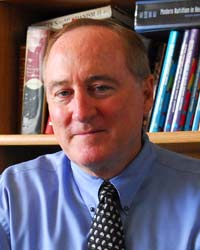
Cancer stem cells are one of the main reasons why cancers are able to survive surgery, chemotherapy and radiation. They are able to hide from those therapies and, at a future date, emerge and spread the cancer in the body once again.

Jionglia Cheng, PhD., the lead author of a new CIRM-funded study, says that’s one of the reasons why pancreatic cancer has proved so difficult to treat.
“Pancreatic cancer remains a major health problem in the United States and soon will be the second most common cause of mortality due to cancer. A majority of pancreatic cancer patients are often resistant to clinical therapies. Thus, it remains a challenge to develop an efficacious clinically useful pancreatic cancer therapy.”
Dr. Cheng, a researcher with ChemRegen Inc., teamed up with John Cashman at the Human BioMolecular Research Institute and identified a compound, that seems to be effective in blocking the cancer stem cells.
In earlier studies the compound, called PAWI-2, demonstrated effectiveness in blocking breast, prostate and colon cancer. When tested in the laboratory PAWI-2 showed it was able to kill pancreatic cancer stem cells, and also was effective in targeting drug-resistant pancreatic cancer stem cells.
In addition, when PAWI-2 was used with a drug called erlotinib (brand name Tarceva) which is commonly prescribed for pancreatic cancer, the combination proved more effective against the cancer stem cells than erlotinib alone.
In a news release Dr. Cheng said: “In the future, this molecule could be used alone or with other chemotherapy albeit at lower doses, as a new therapeutic drug to combat pancreatic cancer. This may lead to much less toxicity to the patient,”
The study is published in the journal Scientific Reports.
Good morning! Is there any information or help that you could provide regarding stem cells That could help our family.
My daughter passed away from colon cancer in her 30s begin with stage for Hodgkin’s at age 15 which the Colon Cancer was unrelated. At myriad Of medical problems i.e. full body paralysis, extreme sensitivities to chemicals allergies respiratory, etc.
My granddaughter has dev. Myriad of medical problems-had her ovary removed -teenager has the Gene For breast cancer, ETc. A lot of medical issues. Respiratory, serious allergies and sensitivities.
Want to learn what Can be done to help our family. Heart and pain issues To point of disability.
I would appreciate any information you may be able to share. Thank you for your kind consideration. Respectfully, Maria 734 981.3952
Sent from my iPad
>
I am so sorry to hear about your granddaughter. That must be so awful for you to watch and for her to have to live with. I am afraid that I don’t know of any stem cell therapies that would be appropriate for her. It seems she has so many problems and I don’ know of a clinical trial underway right now that would be helpful. I’m sorry I can’t be of more help but wish you and your granddaughter all the best.
The genotype and phenotype of cancer stem cells are not stable, they are heterogeneous. For instance, normal melanocytes require multiple growth factors whereas primary melanoma require less growth factors to growth. In contrary, the metastatic cells are independent of growth factors, they have ability to produce abundant of various growth factors to support autocrine growth. The progression of cancer stem cells from primary to metastatic cancers are varying between cell types and individual’s immune system. For instance, melanoma, prostate, breast and bladder cancer are less maglinancy than pancreas and lung cancers which can develop into highly metastatic.
The early study showed that PAWI-2 was able to kill pancreatic cancer stem cells (PCSCs) and drug (erlotinib) -resistant PCSCs. The study proof that PAWI-2 inhibited β3-KRAS signaling by targeting downstream TBKL phosphorylation. The phenotype and genotype of PCSCs are heterogeneous, the cancer stem cells are not stable . The existence of PAWI-2 and erlotinib either alone or combination may trigger the cancer stem cells to become resistant over time. At the begining of chemotherapy, patients may show promising improvement of clinical results, but patients may relapse over time. None of the drug can completely eradicate 100% of PCSCs instantly. This may provide room of opportunity for a small number of cancer stem cells to become growth advantage and develop drug-resisitant. They change their genotype and phenotype to become more aggressive and metastatic. The individual mmune systems play roles to delay the progression of PCSCs. The strong immunity suppresses the outgrowth of PCSCs whereas poor immunity accelerate the cancer stem cells to become more metastatic. The progression of cancer stem cells from one stage to the other is usually followed by altering the existence signaling network or newly development of intracellular signaling network. Therefore, the discovery of new drug may repeat the cycle of developing a new dominant and growth advantage cancer stem cell.